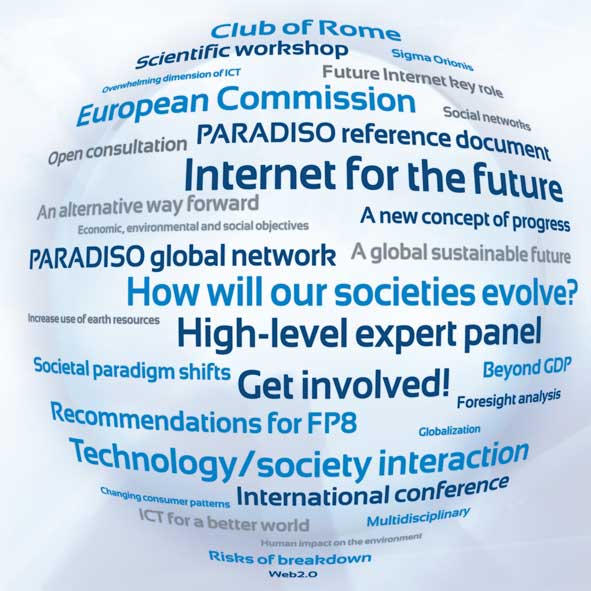The 2011 Paradiso Conference was held on 7-9 Sept targeting "Internet and Societies - New Innovation Paths". The conference including leading experts from industry, research and the European Commission presenting ideas on the future of society, the future of the Internet, societal resilience and a vision for collective awareness and action. It is clear that society continues to grapple with tricky societal, economic and environmental issues. Today’s population uses 50% more resources than the planet can generate and consumption has doubled since 1975. “There is no credible sustainable solution which is also a desirable option” said Jack Jacometti (Shell Int). More dramatically, according to Marc Luycks Ghisi (former member of the "Foresight Studies Unit" of European Commission's President), “We are witnessing a change in civilisation, the public do not believe in current socio-economic structures and with lower trust the industrial/capitalist systems are over”. Economic progress is not delivering an increased quality of life and new value structures that consider qualitative measures may be needed to provide incentives for societal behaviour change.
The EC PASHMINA project, has questioned the dominance of the economic route through four scenarios across the dimensions of speed and levels of collaboration: Growth without limits, growth within limits, turbulent decline and stagnation and new welfare. Growth without limits is the current vision and cannot continue they argue. PASHMINA proposes a new welfare model building on qualitative human development, human rights and also natural right (Well-being and sustainability indicators). Such a model would aim to increase peer-peer relations as opposed to hierarchical structures, increasing awareness & cognitive autonomy, support collective intelligence & responsibility of sustainability, promote freedom of action and empowerment, and enable security with others. These objectives are directly aligned with priorities of the FI ecosystem but go far beyond them. Research will increasingly need to focus promoting the value of network and social capital rather than the continuous drive for economic efficiency and consumption (e.g. virtualisation). None of the visions address the clear tension between the altruistic characteristic required for common good and selfish natures of private interested individuals and companies. It seems unrealistic to believe that society will not suddenly move from individualism to a digital utopia of shared community values enabled by a Future Internet. Many businesses, individuals and states will no doubt remain self-interested. What is apparent is that we are transitioning from a world of abundant resources to a world of constraints. The consequence will be the need for increased personal responsibility and empowerment in aspects of lifestyle such as energy, public services and health. The Future Internet and in more general ICT has great potential to help. “Today we see location-based monitoring is used to protect fisheries, financial systems distribute farm subsidies, satellite images help control diamond mining and mobile technology supporting participative sensing for carbon footprints monitoring” says Stefan Lechner, Director Institute for the Protection and Security of the Citizen, JRC Ispra. But many recent innovations have focused on maximising utilisation and increasing consumption. Technology and business models designed to offer unlimited access to commodity resources such as elastic clouds will become more constrained in future. The Future Internet can help society manage complex and collective problems. However, without a change in societal belief structures any single solution is subject to the displacement effect. Consumers may spend their energy savings on new products and services, home workers may heat their entire homes less efficiently than shared offices. Systems must be designed to consider the total impact and this is where methodologies such as SESERV's Tussle analysis, which considers possible spill overs, may have value. Of course predicting outcomes, desirable or otherwise, is increasingly difficult within such complex systems. Policy decisions are done in a world that is too complex for policy makers to understand and too dynamic for timely responses. In many circumstances consequences of actions will not be fully understood and there’s a tendency to be reactive. Taking action in such an uncertain environment will require greater reliance on experimentation in contrast to design, new ways of measuring success that considers greater chance of failure and helping all FI ecosystem stakeholders to determine their appetite for risk. Many experts are calling for research and development that takes a holistic approach and systemic thinking. This has prompted the creation of the European Internet Science Network of Excellence (EINS) . The objective is to work towards establishing a scientific basis for Internet research that can help in studying the Internet, developing methodologies for FI systems research and enabling effective discourse between different disciplines. EINS takes a multidisciplinary approach that builds on the principles of network science combined with other disciplines from wider social and legal context such as economics, sociology, psychology and complexity. Understanding the nature, influencing and managing Internet networks is key for societies. Metcalf’s law states that the network value scales two times of the number of persons connected . Recent examples from China in response to a crisis event show the value of micro blogs used by both citizens and governments , although censorship of some posts caused anger. Networks do have huge value and making them larger is the goal for all service and infrastructure providers. However, as with all technology, networks can be perceived to have both positive and negative societal consequences. Critiano Codagnone, Senior Scientist, JRC / IPTS, noted that “Networks can change the norms of acceptability, for example, greater obesity and alcohol consumption in some western societies is actually a network problem”. This leads to the ongoing debate about embedding specific values in the Internet architecture . In this context, the goals of SESERV remain highly
relevant. Maintaining focus on assisting technologists in their understanding
of the potential impact of FI technology, techniques for consideirng socio-economics in architecture design, along with barriers and strategies for
adoption through dialog in mulitdiscplinary teams is increasingly important.... |
FISE Conversation >

